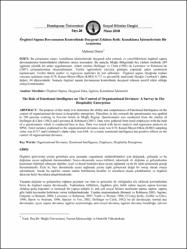Örgütsel sapma davranışının kontrolünde duygusal zekânın rolü: Konaklama işletmelerinde bir araştırma
Abstract
Bu çalışmanın amacı, konaklama işletmelerinde duygusal zeka yetenek ve yeterliliklerinin örgütsel sapma davranışlarının kontrolündeki etkilerini ortaya koymaktır. Bu amaçla, Muğla Bölgesinde beş yıldızlı otellerde 289 işgörene yönelik bir anket uygulanmıştır. Anket soruları Hollinger ve Clark (1982) ile Lawrence ve Robinson’un (2007) çalışmalarından oluşturulmuştur. Veriler işgörenlerle yüzyüze görüşme yapılarak anket yardımıyla toplanmıştır. Veriler faktör analizi ve regresyon analizleri ile test edilmiştir. Örgütsel sapma ölçeğinde toplam varyansı açıklama oranı 0,78; Kaiser-Meyer-Olkin (KMO) 0,717 ve güvenirlik analizinde ölçeğin Cronbach’s alpha değeri, 84 düzeyindedir. Sonuçta örgütsel sapma davranışının kontrolünde duygusal zekanın pozitif etkisi olduğu ortaya konulmuştur. The purpose of this study is to determine the ability and competencies of Emotional Intelligence on the control of organizational deviance in hospitality enterprises. Therefore, in this research the questionnaire was applied to 289 persons working in five-star hotels in Muğla Region. Questionnaire was conducted from the studies of Hollinger & Clark (1982) and Lawrence & Robinson (2007). Data were gathered from hotel employees with the help of a questionnaire which is conducted face to face. Data was tested with factor analysis and regression analysis on SPSS. Total variance explained in the organizational deviance scale was 0,78; Kaiser-Meyer-Olkin (KMO) sampling value was 0,717 and Cronbach& #8217; s alpha value was 0,84. As a result, emotional intelligence has positive effects on the control of organizational deviance.


















